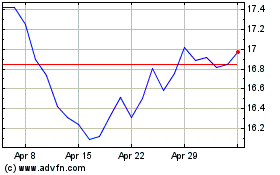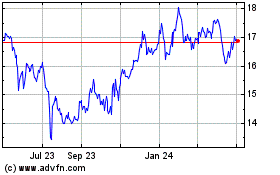Peace Breaks Out Among Activists and Their Prey
November 17 2019 - 11:02AM
Dow Jones News
By Corrie Driebusch
A new playbook is emerging in the world of shareholder activism,
one that calls for quick peace treaties enabling investors and the
companies they target to sidestep costly, protracted battles.
In the past few weeks, AT&T Inc. and Emerson Electric Co.
managed to quickly end high-profile activist challenges -- at least
temporarily -- by agreeing to make modest changes. The hedge funds
besieging them pledged nothing in return.
People involved in the deals insist they are not "settlements,"
the formal arrangements that typically end activist campaigns and
impose strict measures on both parties. Such agreements often
enable activists to name one or more board directors while
preventing them from agitating publicly or waging a proxy fight --
and trading in the stock.
The new setups are more like nonbinding handshake agreements,
and in the case of AT&T and Emerson merely entitle the activist
to recommend or advise on board changes. Emerson has drawn an
investment from D.E. Shaw Group, a hedge-fund firm with an activist
component that praised a new board member the industrial
conglomerate appointed earlier this month.
Elliott Management Corp., AT&T's pursuer, has also reached
non-settlement agreements with Marathon Petroleum Corp. and German
software giant SAP SE in recent months. The hedge-fund firm, one of
the most prolific and aggressive activists, plans to use them as a
template in future campaigns, according to a person familiar with
the matter.
Activists take stakes in companies and push them to make
operational or financial changes to boost their stocks, and have
become a major force shaping the agendas of companies in the U.S.
and Europe.
But both the investors and the companies they target have reason
to cry uncle in the broader war they have been waging the past
several years.
Drawn-out activist campaigns can be expensive and
time-consuming, engendering resentment among executives and board
members. In 2017, Procter & Gamble Co. engaged in a protracted
proxy fight with Trian Fund Management LP. The battle cost at least
$60 million, making it one of the most expensive in history, and
ultimately ended with the consumer-products giant appointing
Trian's Nelson Peltz to its board.
Companies are increasingly attuned to the risk that an activist
will land on their shareholder register, upend their strategy and
undermine their standing with other investors. They frequently
employ so-called defense advisers to game out their response should
they find themselves in an activist's crosshairs, and the
proliferation of informal truces is a sign they are growing more
sophisticated in dealing with the challenge.
Activists, for their part, are grappling with subpar returns and
eager for the increased flexibility and opportunity to tout a quick
victory that the new arrangements afford. An activist hedge fund
index tracked by HFR posted a return of 12% through the end of
October, compared with a return of more than 23% for the S&P
500.
The recent surge in non-settlements fits with a broader
narrative in which Elliott and some of its rivals have worked to
soften their images as they seek to be viewed more as partners than
antagonists.
"There's been a shift toward engagement for some of the larger
activists, " said Lawrence Elbaum, co-head of law firm Vinson &
Elkins LLP's shareholder-activism practice. "These funds want to be
looked at as sophisticated investors that reluctantly turn to the
activism playbook."
The new approach carries risks. A formal settlement is a legal
commitment and without one there is no guarantee one of the parties
won't go back on its promises. Investors with long track records
who are well known to board members, executives and advisers are
more likely to be trusted with a nonbinding agreement than newer,
smaller players, these officials say.
And those changes companies do make may be less consequential
than the ones activists have ushered in over recent years -- to the
benefit of U.S. corporations, many executives acknowledge.
In early September, Elliott sent a pointed 23-page letter to
AT&T, challenging its longtime Chief Executive Randall
Stephenson's acquisition strategy, saying the telecommunications
giant has suffered from "operational and execution issues" over the
past decade and encouraging it to shed assets. It was one of the
biggest activist campaigns in history, given AT&T's market
value of nearly $300 billion.
AT&T reached a resolution with Elliott just seven weeks
later, on the eve of an event to unveil new details of its
much-anticipated HBO Max video-streaming service. The company
promised to "refresh" its board by replacing retiring directors in
the next year and a half. It also outlined a three-year
capital-allocation plan that calls for higher dividends and more
share buybacks, and pledged to actively review its portfolio and
not make any large acquisitions in the near future.
Much of that the Dallas company already planned to do. Elliott
said it approved of the plan and had worked closely with AT&T
to develop it.
Write to Corrie Driebusch at corrie.driebusch@wsj.com
(END) Dow Jones Newswires
November 17, 2019 10:47 ET (15:47 GMT)
Copyright (c) 2019 Dow Jones & Company, Inc.
AT&T (NYSE:T)
Historical Stock Chart
From Mar 2024 to Apr 2024

AT&T (NYSE:T)
Historical Stock Chart
From Apr 2023 to Apr 2024
